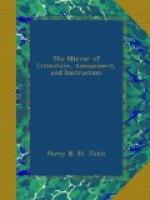Where a cause is good, an appeal should be directed to the heart rather than the head: the application comes more home, and reaches more forcibly, where it is the most necessary—the natural rather than the improved faculties of the human understanding.
Common sense is looked upon as a vulgar quality, but nevertheless it is the only talisman to conduct us prosperously through the world. The man of refined sense has been compared to one who carries about with him nothing but gold, when he may be every moment in want of smaller change.
The grand cause of failure in most undertakings is the want of unanimity. This, however, we find is not wanting where actual danger, as well as possible advantage may accrue to the parties concerned. It is whimsical enough that thieves and other ruffians, while they bid open defiance to the laws, both of God and man, pay implicit obedience to their own.
Aristotle laid it down as a maxim “that all inquiry should begin with doubt.” Whenever, then, we meet with mysteries beyond our feeble comprehension, would it not be more rational to doubt the very faculty we are employing—the capacity of our reason itself.
The most politic, because the most effectual way of governing in a family, is for the husband occasionally to lay aside his supremacy; so in public, as well as private life, that king will be most popular who does not at all times exercise his full prerogative.
It would appear that there is a great sympathy between the mind of man and falsehood: when we have a truth to tell, it takes better, if conveyed in a fable; and the rage for novels shows, that we may not only divert extremely without a syllable of truth, but truth is even compelled to borrow the habit of falsehood to secure itself an agreeable reception.
In our intercourse with others, we should endeavour to turn the conversation towards those subjects with which our companions are professionally acquainted: thus we shall agreeably please as well as innocently flatter in affording them the opportunity to shine; while we should acquire that knowledge which we could no where else obtain so well.
What an extraordinary method of reducing oneself to beggary is gambling! The man who has but little money in the world, and knows not how to procure more without risking his life and character, must needs put it in the power of fortune to take away what he has. Put the case in the opposite light, it is just as absurd: the man who has money to spare, must needs make the experiment whether it may not become the property of another.
It is a mistake to suppose a great mind inattentive to trifles: its capacity and comprehension enable it to embrace every thing.
The failing of vanity extends throughout all classes: the poor have but little time to bestow on their persons, and yet in the selection of their clothes we find they prefer such as are of a flaring and gaudy colour.




